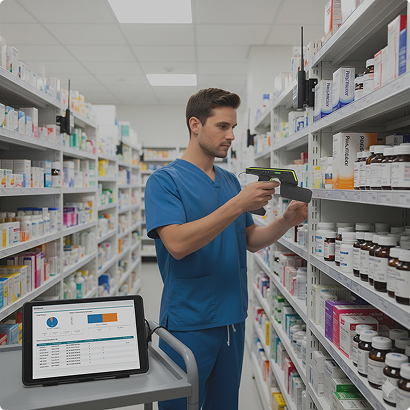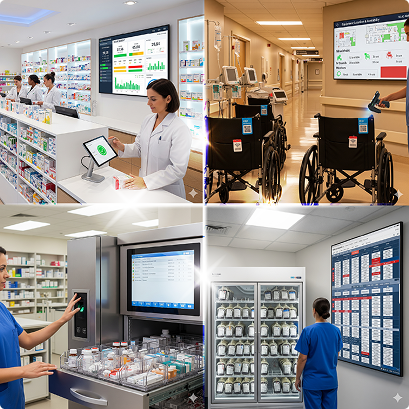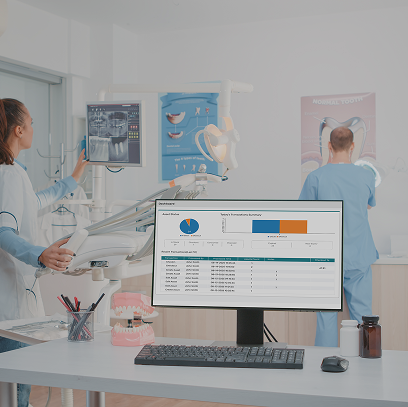RFID in Healthcare Industry
RFID in Healthcare Industry
Why RFID in Healthcare?
In healthcare, every second counts — and so does every detail. Hospitals, clinics, and laboratories must ensure patient safety, maintain equipment readiness, and manage supplies efficiently. Traditional methods, like manual barcode scanning or spreadsheets, often leave room for errors, delays, and compliance risks.
RFID technology offers a smarter, faster, and more reliable way to manage these critical operations.
Key Benefits of RFID in the Healthcare Industry

Improved Patient Safety
RFID-enabled wristbands allow healthcare providers to accurately identify patients throughout their stay, from admission to discharge. By automating medication and treatment verification, RFID reduces human error and ensures that each patient receives the correct care every time.

Efficient Asset Tracking
With RFID, hospitals can instantly locate essential equipment such as wheelchairs, defibrillators, and infusion pumps. Real-time tracking reduces the risk of loss or theft and ensures critical devices are available when and where they are needed most.

Streamlined Inventory Management
RFID technology enables real-time monitoring of medical supplies, pharmaceuticals, implants, and consumables. Automated inventory tracking prevents overstock or shortages, ensuring healthcare facilities maintain optimal stock levels without unnecessary waste or last-minute emergency orders.

Faster Audits & Regulatory Compliance
RFID simplifies audits by generating instant, accurate compliance reports. It also ensures complete traceability of medical devices and supplies, making it easier for healthcare organizations to meet regulatory requirements while saving time and improving operational efficiency.
Industry Challenges Solved by RFID
Without RFID, healthcare facilities often face:
RFID addresses all these pain points by providing real-time, automated, and error-free tracking.
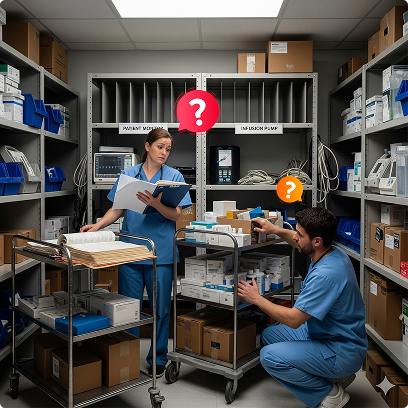
TagMatiks RFID Software for Healthcare
TagMatiks AT is a cloud-based RFID software platform built for healthcare environments, turning RFID data into actionable insights for smarter decision-making. It centralizes asset visibility, tracks the full lifecycle of medical devices, supports maintenance schedules, and enables quick audits. With modular solutions like TagMatiks AT, it helps hospitals efficiently manage equipment and ensure compliance. Scalable for hospitals, clinics, laboratories, and pharmacies.
RFID Solution for Healthcare Settings
UHF RFID Labels
TagMatiks UHF RFID labels are designed for medical tools, equipment, and supplies. They provide durable, accurate identification, even in sterilization environments, enabling precise tracking and improved visibility across hospitals, clinics, laboratories, and pharmacies.


RFID Readers
A combination of handheld and fixed RFID readers enables real-time tracking throughout healthcare facilities. Handheld readers allow mobile scanning, while fixed readers automate monitoring at key locations, ensuring equipment, supplies, and patient-related items are always accounted for.
RFID-Enabled Cabinets
RFID-enabled cabinets offer secure, monitored storage for critical medical supplies and medications. They provide automated usage tracking, access control, and inventory updates, helping healthcare facilities prevent theft, reduce waste, and maintain stock levels effortlessly.
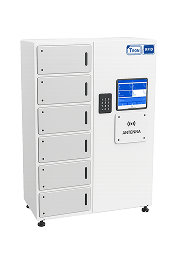

RFID Software
TagMatiks AT centralizes RFID data, offering complete lifecycle tracking for medical devices and equipment. It supports maintenance schedules, streamlines audits, and ensures regulatory compliance while providing healthcare providers with real-time asset visibility and actionable insights.
Frequently Asked Questions (FAQs)
-
What are the main benefits of using RFID for asset tracking?
With RFID, hospitals can instantly locate essential equipment, such as wheelchairs and defibrillators, which reduces the risk of loss or theft and ensures that critical devices are available when and where they are needed.
-
Can RFID technology help with inventory management?
Yes, RFID enables real-time monitoring of medical supplies, pharmaceuticals, and consumables. This automated tracking prevents overstock or shortages, ensuring facilities maintain optimal stock levels without waste or last-minute emergency orders.
-
What challenges does RFID solve in healthcare facilities?
RFID addresses common problems such as inaccurate manual tracking, time-consuming audits, equipment hoarding, expired or lost medications, and regulatory non-compliance by providing real-time, automated, and error-free tracking.
-
What are some key use cases for RFID in healthcare?
Key use cases include hospital equipment tracking, surgical instrument sterilization tracking, blood bag monitoring, medication dispensing control, and pharmacy inventory management.
-
What specific RFID solutions are available for healthcare settings?
Solutions include UHF RFID labels for tools and equipment, a combination of handheld and fixed RFID readers for real-time tracking, RFID-enabled cabinets for secure storage, and RFID software like TagMatiks AT to centralize data and provide actionable insights.
-
Can TagMatiks be integrated with existing systems?
Yes, the content mentions that the solutions from RFID4U are designed to "seamlessly integrate TagMatiks software with top-tier RFID hardware for maximum efficiency."

